Knowledge Sharing
Commercial Building Services: Keys to Success
Delivering exceptional commercial building services requires more than technical expertise—it demands a strategic focus on communication, leadership, and collaboration. Behind every successful project lies a combination of strong leadership, effective communication, and a commitment to collaboration. These principles not only streamline workflows and ensure timely project delivery but also foster trust and collaboration among all stakeholders, leading to exceptional results and long-term client satisfaction.
Keys to Providing Effective Commercial Building Services
To succeed in commercial construction, effective communication, strong relationships, leadership, knowledge, and training are crucial. These elements play a vital role in ensuring successful projects and client satisfaction.
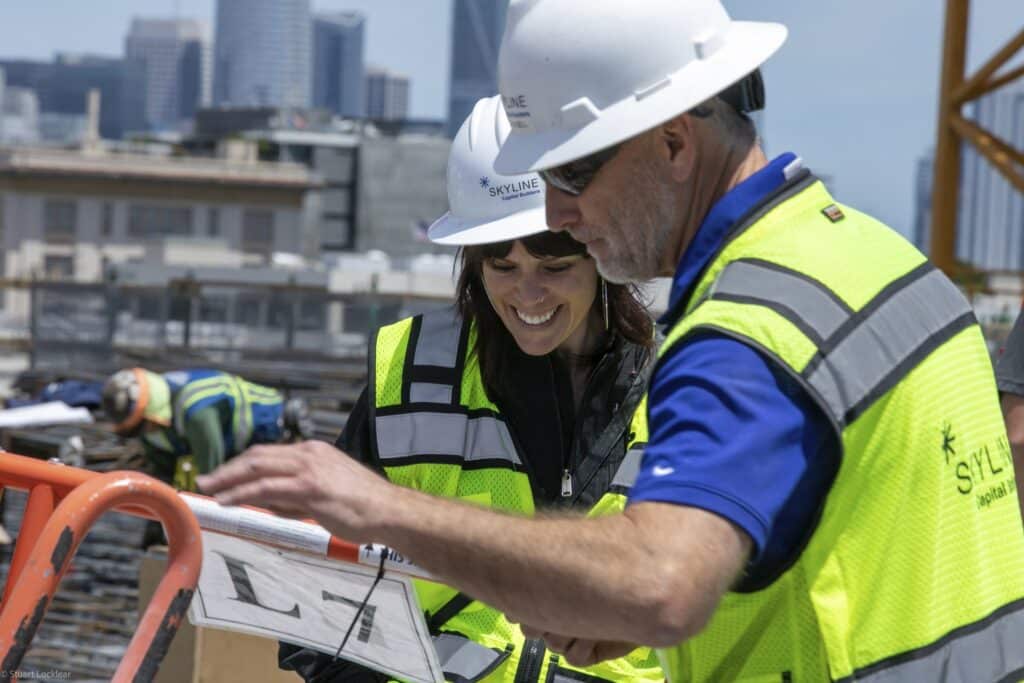
Effective Communication
Effective communication is key to providing top-notch service. An interior contractor must share clear updates and listen carefully to understand customers’ needs. This ensures everyone understands the goals and steps required.
Teams that communicate well can solve problems faster. They make sure safety rules are followed on-site. Collaboration and clear communication among team members ensure tasks are completed efficiently, leading to faster project completion and cost savings.
Strong Relationships
Strong connections with clients, suppliers, and trade partners help projects run smoothly. People work better together when they trust each other. This trust leads to better deals, more support, and fewer problems.
Leadership
Effective management in business facility services signifies supervising teams to achieve project objectives. Managers resolve issues, make choices, and keep the projects on the path. They grasp the job and understand how to inspire their team.
They convey precise strategies and are open to responses. This assists everyone to remain oriented for success in every project they manage.
Knowledge
A comprehensive understanding of construction practices, local codes, and industry standards is crucial for successful service provision. Keeping up with the latest construction technologies, safety protocols, and environmental regulations is vital to ensure that projects are completed efficiently and meet all legal requirements.
Knowledge isn’t just about knowing facts; it’s also about having the ability to apply that knowledge in real-world situations. This requires a continuous learning mindset and staying updated with current trends and best practices within the industry.
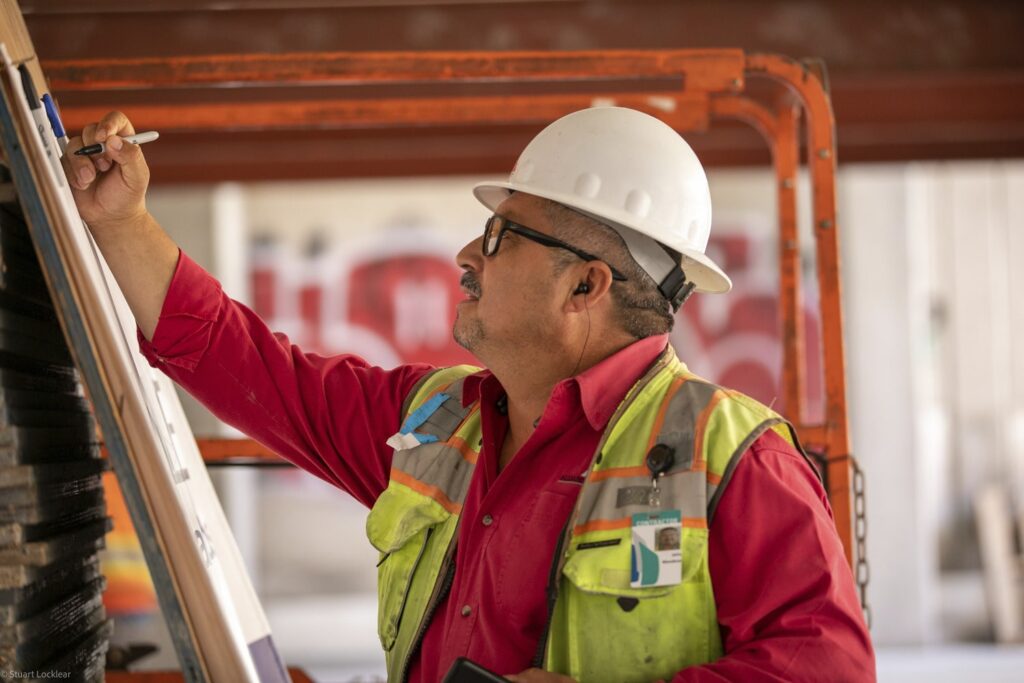
Training
Training is vital. It equips the team with the necessary skills and knowledge to handle complex projects efficiently. Well-trained personnel are better equipped to ensure job site safety, coordinate tasks, and solve problems effectively.
When contractors invest in training their teams, it reflects positively on project outcomes. For example, according to industry data, companies that provide comprehensive training to their employees experience 24% higher profit margins than those that don’t prioritize training.
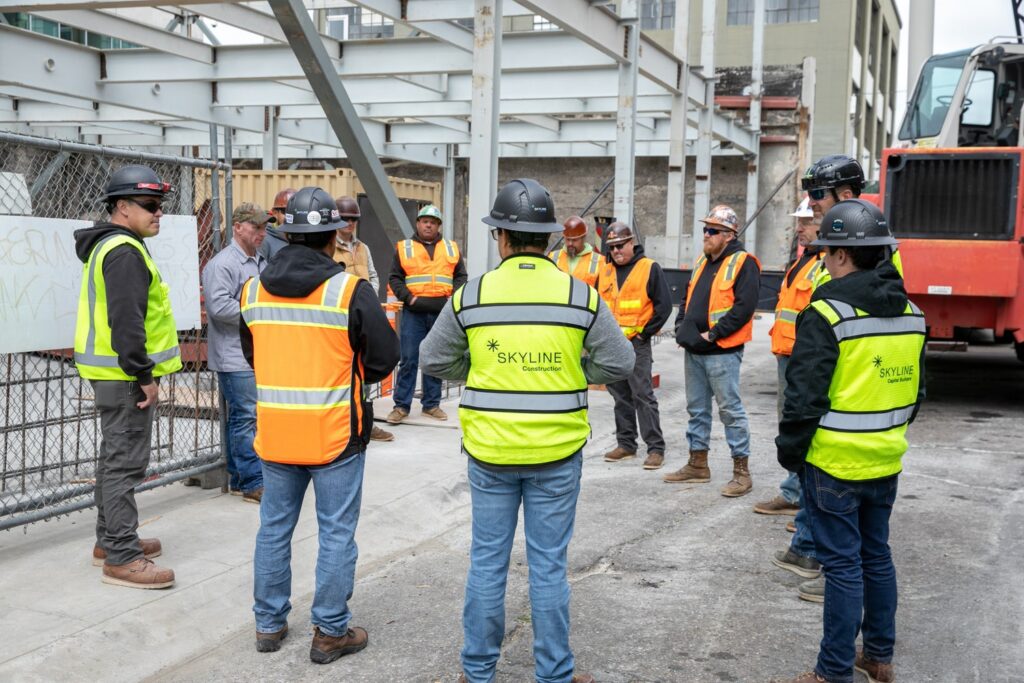
Benefits of Effective Communication in Commercial Building Services
Effective communication in commercial renovation services results in faster project completion, efficient task coordination, improved problem-solving, and increased job site safety. These benefits contribute to a smooth workflow, successful project outcomes, and higher customer satisfaction.
Faster Completion of Projects
Effective communication in commercial building services accelerates project completion. Clear and open communication facilitates faster progress and understanding, ensuring that tasks are completed on time.
When teams communicate effectively, they can promptly address issues, leading to efficient problem-solving. With proper coordination and a shared understanding of goals, projects progress smoothly toward timely completion.
Efficient scheduling is essential for expediting projects. Effective communication allows for precise planning and sequencing of tasks, minimizing downtime and maximizing productivity. This streamlined approach ensures that every aspect of the project moves forward without unnecessary delays, contributing to quicker project delivery.
The use of digital tools also significantly hastens project completion. From automated task tracking to real-time collaboration platforms, technology enhances communication among team members and stakeholders, thereby expediting decision-making processes and keeping the project timeline on track.
Efficient Coordination of Tasks
Efficient organization of tasks is crucial for successful commercial building services. It involves arranging and managing various activities to align with project timelines and goals. Tasks must be scheduled, assigned, and tracked diligently to maintain a smooth workflow on the construction site.
Effective task organization contributes to project efficiency by streamlining processes, reducing delays, and maximizing resources. Through clear communication and strategic planning, tasks can be aligned with each other seamlessly, leading to faster project completion.
This not only enhances productivity but also minimizes disruptions that can impact the construction schedule. Moreover, an efficient organization fosters a safer work environment by ensuring that different tasks are carried out in a well-orchestrated manner.
Collaborating closely with trade partners and suppliers while staying updated on progress through regular reports or meetings where necessary ensures the effective organization of tasks throughout each phase.
Improved Problem Solving
Improved problem-solving is a crucial benefit of effective communication in commercial building services. By fostering clear and open communication channels, teams can address issues promptly and efficiently.
This leads to quicker resolution of challenges encountered during projects, ensuring that construction timelines are adhered to and costs are kept under control. Enhanced problem-solving abilities also contribute to maintaining a safe job site, preventing potential hazards from unresolved issues.
Moreover, when all stakeholders actively communicate and collaborate, they bring diverse perspectives to the table which enriches the problem-solving process. This diversity aids in identifying innovative solutions and alternatives when faced with complex or unexpected hurdles in commercial construction projects.
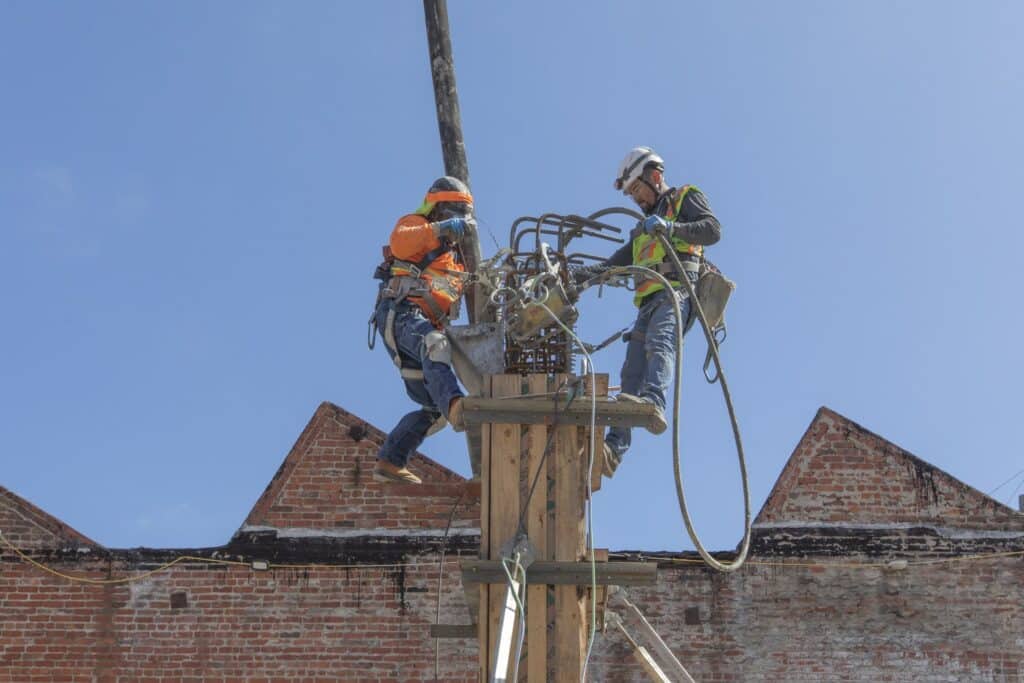
Increased Job Site Safety
Positive communication in commercial building services enhances job site safety. Clear communication prevents accidents by ensuring workers grasp safety protocols and are alert to potential hazards.
It also encourages swift response to emergencies, diminishing the risk of injury. As indicated by the Bureau of Labor Statistics, enhanced communication on construction sites can considerably lessen workplace accidents, ultimately boosting overall productivity and project timelines.
In reality, a study by Dodge Data & Analytics discovered that companies with robust safety programs grounded in effective communication encountered up to 70% fewer accidents than those lacking such measures.
The Role of a General Contractor in Promoting Communication on a Commercial Interior Construction Project
As the primary liaison between stakeholders—including clients, business partners, and trade partners—a general contractor plays a critical role in facilitating communication on a commercial interior construction project.
Project Planning and Estimating
During project planning and estimating, the general contractor meticulously assesses the requirements for the commercial building project. This involves identifying tasks, setting timelines, and estimating costs. Accurate estimation is crucial to prevent budget overruns and delays that could affect the overall success of the project.
Leveraging industry experience and local knowledge during this phase can lead to more precise estimations, ultimately contributing to a successful commercial building service.
The role of a general contractor in project planning and estimating is foundational as it sets the pace for subsequent stages of construction. A comprehensive understanding of logistics and coordinating various elements within this initial step is key in ensuring that projects progress smoothly and efficiently.
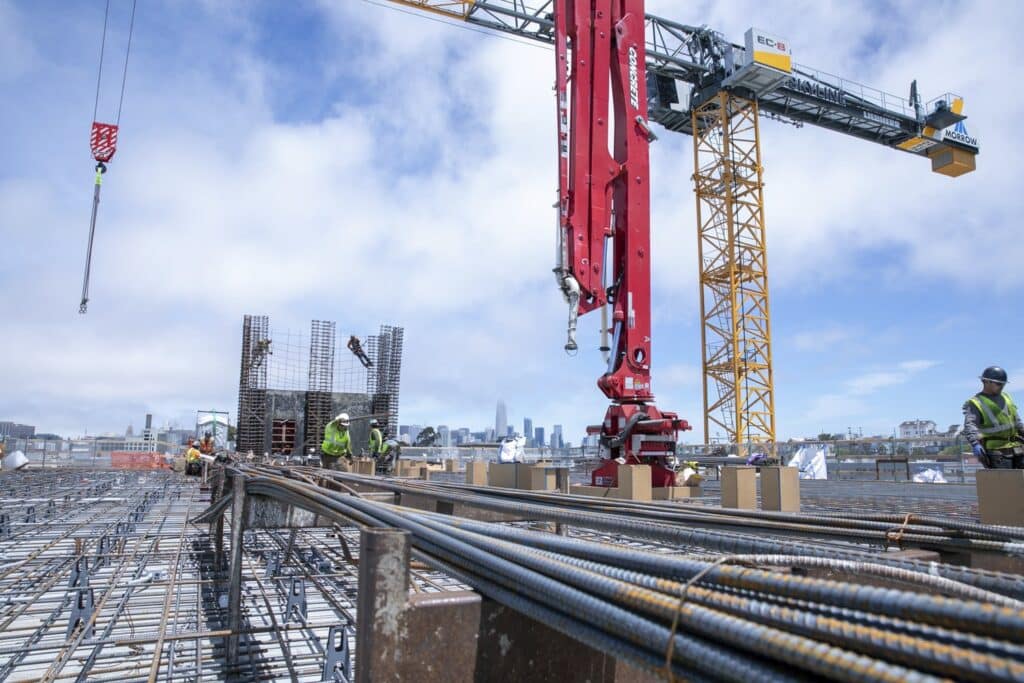
Material Sourcing and Supply Chain
Material sourcing and supply chain management play a crucial role in the success of commercial building services. Timely access to quality materials is vital for project efficiency and cost control.
General contractors must select suppliers based on reliability, quality, and cost-effectiveness to ensure smooth and timely delivery.
Effective supply chain management can lead to streamlined processes, reduced construction delays, and improved project outcomes.

Trade partner Selection and Support
The general contractor should carefully choose trade partners based on their experience, reliability, and track record.
This is important to ensure top-notch workmanship that meets project requirements within the set timelines. Support involves providing clear guidelines, necessary resources, and prompt issue resolution to trade partners during the entire project phase.
Partnering with trustworthy trade partners with a proven history of delivering high-quality work can significantly contribute to the success of commercial building projects. Providing adequate support to them ensures smooth operations, timely delivery of materials, adherence to safety protocols, and efficient problem-solving when challenges arise throughout the construction process.
Scheduling and Sequencing
Efficiently planned schedules ensure that tasks are completed on time, reducing delays and controlling costs.
A well-sequenced plan also helps in optimizing workflow and resource allocation. For example, labor-intensive tasks can be strategically scheduled to avoid conflicts or bottlenecks.
Effective scheduling and frequent communication of the milestones play a significant role in managing the momentum, ultimately contributing to its successful completion within timelines while meeting quality standards.
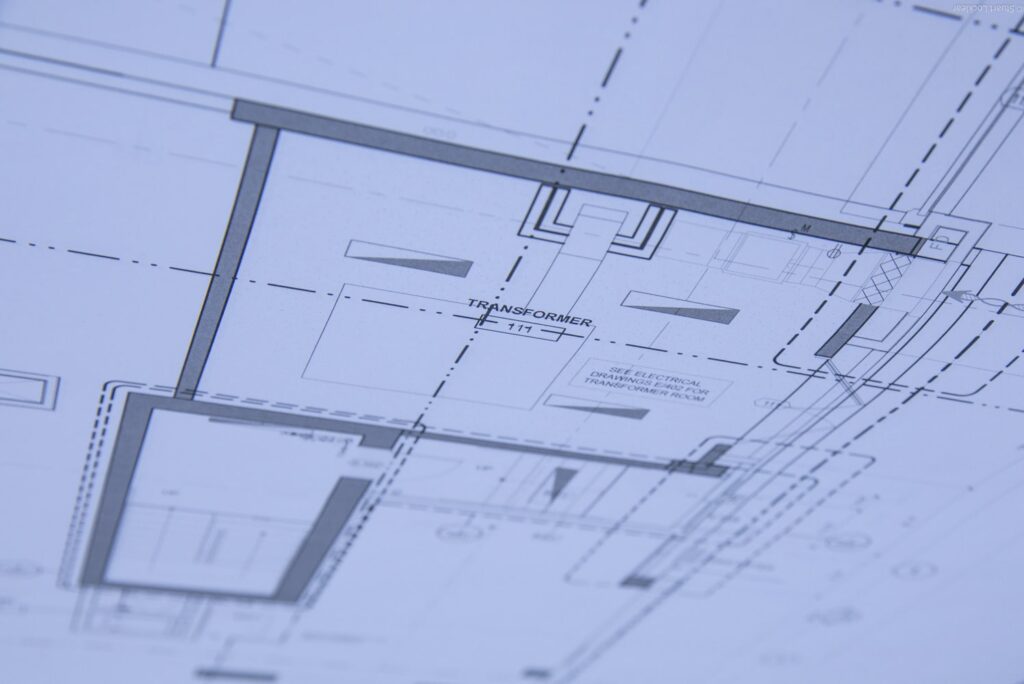
Permitting and Inspections
When managing permitting and inspections for a commercial interior construction project, it’s essential to ensure compliance with local regulations.
This includes obtaining the necessary permits before starting any work on the project. Proper compliance with permitting and inspections not only avoids delays but also ensures a safe working environment for all involved.
General contractors must ensure that the project meets all applicable codes and standards before inspections take place. Navigating the complexities of permitting and inspection processes is a critical responsibility, requiring meticulous attention to securing the necessary permits and coordinating inspections.
Failure to adhere to these regulations can lead to costly fines and delays in project completion, highlighting the significance of thorough understanding and adherence to permitting and inspection processes throughout every phase of a commercial interior construction project.
Finding a General Contractor That Can Ensure Effective Communication
To ensure successful commercial building projects, choosing a general contractor with strong communication skills is essential. A contractor with local expertise and industry knowledge can navigate complexities like permitting, inspections, and zoning with ease. Effective communication fosters collaboration, keeps all stakeholders aligned, and minimizes delays or rework. Building trust and maintaining clear, open dialogue at every stage of the project ensures a seamless construction process and outstanding results. By prioritizing these qualities, businesses can partner with a contractor who not only meets their needs but also delivers exceptional service and value.
MEET WITH OUR EXPERTS
READ NEXT
